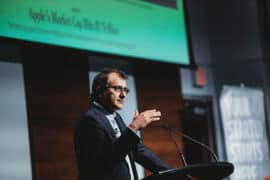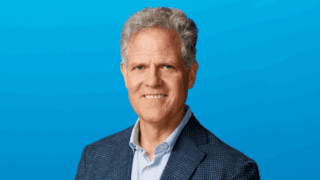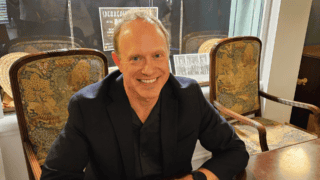The Lavin Agency Speakers Bureau
A speakers bureau that represents the best original thinkers,
writers, and doers for speaking engagements.
A speakers bureau that represents the best original thinkers,
writers, and doers for speaking engagements.
A nation's prosperity relies on its institutions: the more inclusive, the better.
Co-author of the international bestseller Why Nations Fail, 2024 Nobel Prize winner James Robinson reveals the political foundations upon which our economic growth lies. Why do some countries thrive economically, while others fall into poverty? What does China’s unprecedented growth mean for America’s rank as the world’s largest economy? And how do our man-made institutions influence economic success (or lack thereof)? This economist and political scientist’s eye-opening talks draw from decades of original research to explain why a radically inclusive economic model is beneficial for our freedom, prosperity, and innovation.
“The Narrow Corridor takes us on a fascinating journey, across continents and through human history, to discover the critical ingredient of liberty. In these times, there can be no more important search—nor any more important book.”— George Akerlof, Nobel laureate in Economics
Our institutions are the overlooked key to strong countries and democracies, says economist and Nobel Prize winner James Robinson. James won the 2024 Nobel Prize for Economics for his groundbreaking work on the vital role of institutions in prosperity and innovation, encapsulated in his international bestseller Why Nations Fail (co-authored with his frequent collaborator, MIT’s Daron Acemoglu). Drawing on fascinating real-world stories like the town on the U.S./Mexico border that has a dramatic difference in prosperity on either side of the border, James reveals how we can strengthen our institutions—and through them, our communities, our countries, and our world.
In his latest book The Narrow Corridor—also co-authored with Daron Acemoglu—he explores the tenuous conditions of freedom, and why it flourishes in some states over others. From the American Civil Rights movement, to China’s Imperial traditions, to Europe’s fraught recent history, James deftly shows us that liberty is achieved only when a delicate balance between state and society is formed—one which, if left unchecked can easily lend itself to authoritarianism or anarchy. Incredibly relevant in today’s destabilizing moment, The Narrow Corridor was named one of the Best Books of the Year by both the Financial Times and Kirkus Reviews, with the latter calling it “Provocative and intuitively correct. An endlessly rewarding book.”
“Why Nations Fail is a splendid piece of scholarship and a showcase of economic rigor.”— The Wall Street Journal
James’s previous book, Why Nations Fail: The Origins of Power, Prosperity, and Poverty was the culmination of 15 years of groundbreaking research. The book explores the gap between rich and poor countries with historical evidence that dates all the way back to the Roman Empire, and crisscrosses the globe from Latin America to the United States. To date, Why Nations Fail has been translated into 32 languages and made both the New York Times and The Wall Street Journal bestseller lists. It was named one of the best books of the year by The Washington Post, Financial Times, The Economist, Bloomberg, and more.
Prior to that, James and Daron authored Economic Origins of Dictatorship and Democracy together—another path-breaking tome that examines why different social groups prefer different political institutions. Commended as “brilliant,” by the Financial Times, this book offers a framework for understanding the very creation and consolidation of democracy itself.
James is the Reverend Dr. Richard L. Pearson Professor of Global Conflict Studies at the University of Chicago, as well as the Institute Director of The Pearson Institute for the Study and Resolution of Global Conflicts. He was previously on the faculty at Harvard University, where he was the Wilbur A. Cowett Professor of Government. Robinson also previously served as an advisor to the World Bank’s Report on Governance. He holds a Ph.D from Yale University, an MA from the University of Warwick, and a BSc from the London School of Economics and Political Science.

Harvard Economist MacArthur Genius Studying Economic Opportunity Director of Opportunity Insights
Author of The Age of Cryptocurrency and Our Biggest Fight Co-Host of the Money Reimagined Podcast MIT Media Advisor

Artificial Intelligence & Machine Learning Expert Founder of the Creative Destruction Lab Bestselling Co-Author of Prediction Machines and Power and Prediction

One of America's Foremost Experts on the Declaration of Independence Award-Winning Author, Disunion Among Ourselves

Harvard Economist MacArthur Genius Studying Economic Opportunity Director of Opportunity Insights

Author of Morningside and THE AMERICANO

Author of Jerks at Work and Job Therapy NYU Professor of Psychology

Global AI Advisor CEO & Co-Founder of XLabs and Ribo One of Forbes’ 30 Women in AI to Watch Artificial Intelligence Pioneer

Author of Self-Compassion: The Proven Power of Being Kind to Yourself Co-founder of the Center for Mindful Self-Compassion

#1 New York Times Bestselling Author of Grit and Situated | Pioneering Researcher on Grit, Perseverance, and the Science of Success

Nobel Prize Winner | 3rd Most Cited Economist in the World | Bestselling Co-Author of Why Nations Fail and Power and Progress

Harvard Business School Behavioral Science Professor | "40 Under 40 MBA Professor" | Author of TALK: The Science of Conversation and the Art of Being Ourselves

#1 New York Times Bestselling Co-Author of Abundance | Host of thePlain English Podcast | Founder of the Substack Derek Thompson

#1 New York Times Bestselling Author of How the Word Is Passed and Above Ground | The Atlantic Staff Writer

Why are some nations rich and others poor? Why is the world divided by wealth and poverty, health and sickness, food and famine? In this riveting talk, James Robinson reveals the factors that make the city of Nogales, a place half in Arizona and half in Mexico, outperform its southern neighbor. He explains why Botswana succeeds while neighboring Congo does not, and, among other striking stories, he explains why North Korea fails where South Korea thrives.
In speaking on why the average person in the U.S. is ten times as prosperous as the average Guatemalan, 20 times as prosperous as the average North Korean, and 40 times as prosperous as those living in the Congo, this Nobel Prize winner presents new insights on the crucial role of incentives and institutions, as well as the absolutely essential role of strong governments. This sweeping, detailed, and highly optimistic talk refutes much of what we know about why some countries are mired in poverty while others are perpetually successful — and it lays out a roadmap for real change.